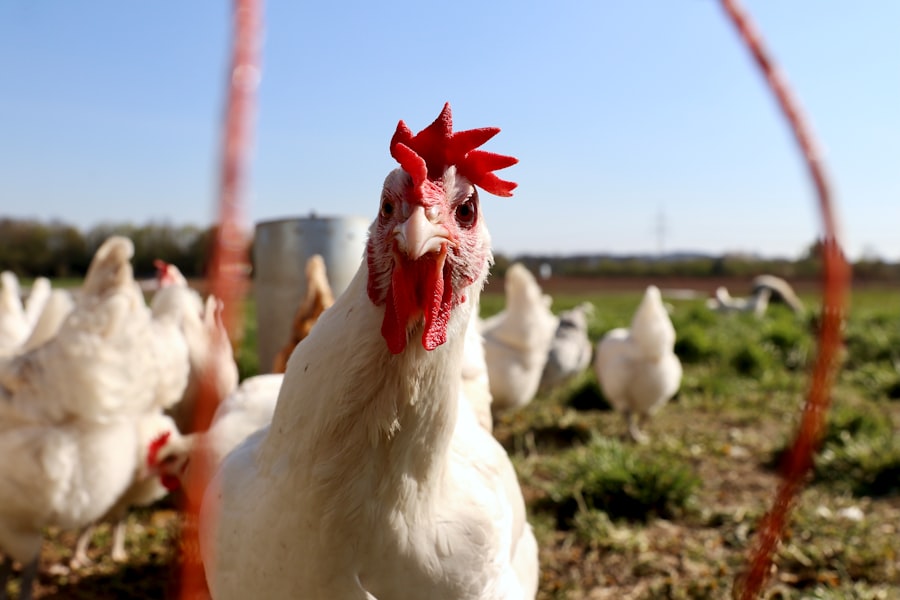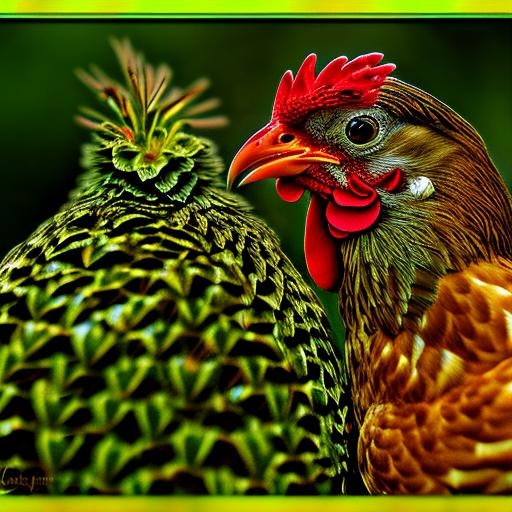Keeping chickens in a vegetable garden is a growing trend among gardeners and homesteaders. It offers a unique opportunity to combine the benefits of both gardening and raising chickens. Not only do chickens provide fresh eggs and meat, but they also offer several advantages for the garden itself. In this article, we will explore the benefits of keeping chickens in a vegetable garden, factors to consider before getting chickens, tips for building a chicken coop, and how to integrate chickens into a garden setting.
Key Takeaways
- Keeping chickens in a vegetable garden can provide numerous benefits, including natural pest control and fertilizer production.
- Before keeping chickens in a vegetable garden, it is important to consider factors such as local regulations and the amount of space available.
- Building a chicken coop in a vegetable garden requires careful planning and consideration of materials and layout.
- Regular maintenance and cleaning of a chicken coop is essential for the health and well-being of the chickens and the garden.
- Integrating chickens into a vegetable garden can be a rewarding and sustainable way to produce fresh food and promote a healthy ecosystem.
Benefits of keeping chickens in a vegetable garden
One of the main benefits of keeping chickens in a vegetable garden is pest control. Chickens are natural foragers and will eat insects, slugs, snails, and other pests that can damage your plants. They can help keep your garden free from harmful pests without the need for chemical pesticides. Additionally, chickens can help control weed growth by scratching and pecking at the ground, reducing the need for manual weeding.
Another benefit of having chickens in a vegetable garden is fertilization. Chickens produce manure, which is rich in nutrients that can be used to fertilize your plants. Their manure can be composted and added to your garden beds or used as a top dressing around plants. This natural fertilizer can help improve soil fertility and promote healthy plant growth.
Personal experiences with keeping chickens in a garden have shown that they can also provide entertainment and companionship. Chickens have unique personalities and behaviors that can be enjoyable to observe. They can also provide a sense of connection to nature and the cycle of life as you witness them lay eggs and raise their young.
Factors to consider before keeping chickens in a vegetable garden
Before getting chickens for your vegetable garden, there are several important factors to consider. First, check your local laws and regulations regarding keeping chickens. Some areas may have restrictions on the number of chickens allowed or require permits. It’s important to ensure that you are in compliance with any regulations before bringing chickens into your garden.
Space requirements are another important consideration. Chickens need enough space to roam and forage, as well as a secure area for shelter and nesting. The size of your garden and the number of chickens you plan to keep will determine the amount of space needed. It’s important to provide enough room for the chickens to move around comfortably without overcrowding.
Predator protection is also crucial when keeping chickens in a vegetable garden. Chickens are vulnerable to predators such as raccoons, foxes, and hawks. Ensure that your chicken coop is secure and predator-proof, with sturdy fencing and a covered run area. Consider installing motion-activated lights or alarms to deter nighttime predators.
Researching and preparing for keeping chickens in a garden setting is essential. Learn about different chicken breeds and their specific needs, as well as basic chicken care and health requirements. Consider joining local poultry groups or online forums to connect with experienced chicken keepers who can offer advice and support.
Building a chicken coop in a vegetable garden
Having a chicken coop is essential when keeping chickens in a vegetable garden. A coop provides shelter, protection from predators, and a place for chickens to lay eggs. When building a chicken coop, there are several important factors to consider.
First, choose a location for your chicken coop that is convenient for both you and the chickens. It should be easily accessible from your house and garden, but also provide some privacy and protection from harsh weather conditions. Consider placing the coop near a water source for easy access.
When it comes to materials, choose durable and weather-resistant materials that will withstand the elements. Common materials used for building chicken coops include lumber, wire mesh, roofing materials, and hardware such as hinges and latches. Ensure that the materials you choose are safe for chickens and will not harm them.
Choosing the right chicken coop plan for a vegetable garden
There are several different types of chicken coop plans available, each with its own pros and cons. The right chicken coop plan for your vegetable garden will depend on factors such as the size of your garden, the number of chickens you plan to keep, and your personal preferences.
One popular option is a stationary coop, which is a permanent structure that remains in one location. This type of coop provides stability and security but may require more space. Another option is a mobile or portable coop, which can be moved around the garden to allow chickens access to different areas. This type of coop is ideal for smaller gardens or for those who want to rotate their chickens around different parts of the garden.
Consider the design and layout of the coop as well. Look for plans that include features such as nesting boxes, roosting bars, and ventilation. The layout should be practical and functional, with easy access for cleaning and maintenance.
Materials needed for building a chicken coop in a vegetable garden

When building a chicken coop in a vegetable garden, you will need several materials to construct the structure. The specific materials needed will depend on the design and size of the coop, but some common materials include lumber, wire mesh, roofing materials, and hardware.
Lumber is used for framing the coop and creating walls, floors, and roofs. Choose pressure-treated lumber or cedar for durability and resistance to rot. Wire mesh is essential for creating a secure enclosure to keep predators out. Opt for heavy-duty wire mesh with small openings to prevent predators from squeezing through.
Roofing materials such as corrugated metal or asphalt shingles are needed to protect the coop from rain and other elements. Hardware such as hinges, latches, and screws are necessary for assembling the coop and securing doors and windows.
When sourcing materials, consider visiting local hardware stores or lumberyards. They may have a variety of options and can offer advice on the best materials for your specific needs. Additionally, consider repurposing or recycling materials to reduce costs and environmental impact.
Designing the layout of a chicken coop in a vegetable garden
Designing the layout of a chicken coop in a vegetable garden is important for maximizing space and accessibility. Consider the size of your garden and the number of chickens you plan to keep when designing the layout.
Start by determining the location of the coop within the garden. It should be easily accessible from your house and garden, but also provide some privacy and protection from harsh weather conditions. Consider placing the coop near a water source for easy access.
Next, consider the placement of features such as nesting boxes, roosting bars, and feeders. Nesting boxes should be located in a quiet and secluded area to provide privacy for hens when laying eggs. Roosting bars should be positioned higher up in the coop to allow chickens to perch comfortably at night.
Ensure that there is enough space for chickens to move around and forage within the coop and run area. Chickens need room to stretch their wings and engage in natural behaviors such as scratching and dust bathing. Provide ample space for them to roam freely without overcrowding.
Maintenance and cleaning of a chicken coop in a vegetable garden
Regular maintenance and cleaning of a chicken coop in a vegetable garden are essential for keeping chickens healthy and preventing the spread of diseases. A clean coop also promotes healthy plant growth in the garden.
Start by establishing a regular cleaning schedule. Remove soiled bedding, droppings, and any leftover food daily to prevent odors and pests. Replace bedding material as needed to keep the coop clean and dry.
Deep clean the coop at least once a month by removing all bedding, scrubbing surfaces with a mild detergent, and rinsing thoroughly. Allow the coop to dry completely before adding fresh bedding.
Inspect the coop regularly for signs of damage or wear. Repair any holes or gaps in the fencing to prevent predators from entering. Check for loose or broken hardware and replace as needed.
How to integrate chickens into a vegetable garden
Integrating chickens into a vegetable garden can be a rewarding experience that benefits both the chickens and the garden. There are several tips and strategies for successfully integrating chickens into a garden setting.
Provide chickens with access to garden scraps and kitchen leftovers. Chickens are omnivores and will eat a variety of foods, including fruits, vegetables, grains, and protein sources. Feeding them scraps from your garden and kitchen not only reduces waste but also provides additional nutrients for the chickens.
Use chicken manure as fertilizer for your garden. Chicken manure is rich in nitrogen, phosphorus, and potassium, which are essential nutrients for plant growth. Compost the manure before using it in your garden to reduce the risk of pathogens and to allow the nutrients to break down and become more readily available to plants.
Consider using chickens for natural weed control. Chickens will scratch and peck at the ground, helping to control weed growth in your garden. Allow them access to areas with overgrown weeds or use them to clear out old garden beds before planting new crops.
Conclusion and final thoughts on keeping chickens in a vegetable garden
Keeping chickens in a vegetable garden offers numerous benefits, including pest control, fertilization, entertainment, and companionship. However, there are important factors to consider before getting chickens, such as local laws and regulations, space requirements, and predator protection.
Building a chicken coop in a vegetable garden requires careful planning and consideration of factors such as location, materials, and layout. Regular maintenance and cleaning of the coop are essential for keeping chickens healthy and preventing the spread of diseases.
Integrating chickens into a vegetable garden can be achieved by providing them with access to garden scraps, using their manure as fertilizer, and utilizing their natural behaviors for weed control. With proper planning and care, keeping chickens in a vegetable garden can be a rewarding and sustainable practice.
If you’re considering keeping chickens in your vegetable garden, you may also be interested in learning about the possibility of keeping guinea fowl alongside your chickens. Guinea fowl are known for their pest control abilities and can help keep your garden free from unwanted insects. To find out more about whether guinea fowl can live with chickens, check out this informative article on Poultry Wizard: Can Guinea Fowl Live with Chickens? Additionally, if you’re looking for inspiration on building a farmhouse-style chicken coop for your feathered friends, Poultry Wizard has a great article that provides tips and ideas: Farmhouse Chicken Coop: Tips and Ideas. And if you’re interested in breeding turkeys, you might want to learn more about their mating season. Poultry Wizard has an article that covers this topic in detail: Mating Season for Turkeys: What You Need to Know.
FAQs
Can I keep chickens in my vegetable garden?
Yes, you can keep chickens in your vegetable garden. However, there are some things you need to consider before doing so.
What are the benefits of keeping chickens in my vegetable garden?
Chickens can help control pests in your garden, provide natural fertilizer, and produce fresh eggs.
What are the drawbacks of keeping chickens in my vegetable garden?
Chickens can damage your plants by scratching and pecking, and they can also spread diseases to your plants. They also require proper care and maintenance.
What do I need to consider before keeping chickens in my vegetable garden?
You need to consider the size of your garden, the number of chickens you want to keep, and the type of chickens that are suitable for your area. You also need to provide proper shelter, food, and water for your chickens.
What type of chickens are suitable for my vegetable garden?
Chickens that are good foragers and have a gentle temperament are suitable for vegetable gardens. Some examples include Rhode Island Reds, Plymouth Rocks, and Sussex.
How do I protect my vegetable garden from chickens?
You can protect your vegetable garden from chickens by using fencing, netting, or chicken wire. You can also provide a separate area for your chickens to roam and forage.
Meet Walter, the feathered-friend fanatic of Florida! Nestled in the sunshine state, Walter struts through life with his feathered companions, clucking his way to happiness. With a coop that’s fancier than a five-star hotel, he’s the Don Juan of the chicken world. When he’s not teaching his hens to do the cha-cha, you’ll find him in a heated debate with his prized rooster, Sir Clucks-a-Lot. Walter’s poultry passion is no yolk; he’s the sunny-side-up guy you never knew you needed in your flock of friends!







